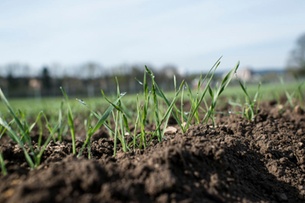Soil formation is a very slow process: it takes between 10 and 30 years, depending on the area, for the thickness of a layer of earth to grow by 1 millimetre. (Keystone) - Click to enlarge A first nationwide report on the health of Swiss soils has shown that virtually all are polluted and that the resource is not being put to sustainable use. The report, published Thursday by the Federal Office for the Environment in collaboration with the offices for agriculture and spatial development, brings together information about soil health that until now has been gathered in isolation through separate cantonal or regional research projects. Despite some remaining gaps in the data, the environment office concludes that
Topics:
Swissinfo considers the following as important: Business, Featured, newslettersent, Swiss Markets and News
This could be interesting, too:
Nachrichten Ticker - www.finanzen.ch writes Die Performance der Kryptowährungen in KW 9: Das hat sich bei Bitcoin, Ether & Co. getan
Nachrichten Ticker - www.finanzen.ch writes Wer verbirgt sich hinter der Ethereum-Technologie?
Marc Chandler writes March 2025 Monthly
Mark Thornton writes Is Amazon a Union-Busting Leviathan?

Soil formation is a very slow process: it takes between 10 and 30 years, depending on the area, for the thickness of a layer of earth to grow by 1 millimetre. (Keystone) - Click to enlarge
A first nationwide report on the health of Swiss soils has shown that virtually all are polluted and that the resource is not being put to sustainable use.
The report, published Thursday by the Federal Office for the Environment in collaboration with the offices for agriculture and spatial development, brings together information about soil health that until now has been gathered in isolation through separate cantonal or regional research projects. Despite some remaining gaps in the data, the environment office concludes that one thing is clear: Swiss soils are being damaged through pollution, waterproofing, erosion and compaction.
These consequences of human activity will likely be compounded by additional risks brought about by climate change, said the report, citing increased erosion due to more frequent heavy precipitation, or damage to soil ecosystems from increasingly intense periods of summer drought.
What is waterproofing?
Soils become impermeable to water when they are covered by humans with asphalt, concrete, gravel or stone. This can result in the loss of natural functions of the soil, such as habitat for many different types of organisms, as well as absorption and filtration of water and gas exchange with the atmosphere. When heavy rains fall, the risk of flooding is increased as the water cannot be absorbed by the soil and the runoff overwhelms streams and rivers.
According to the environment office’s report, one half-square metre of soil is waterproofed every second in Switzerland. Between 1985 and 2009, the habitable area in Switzerland increased by 23.4% — an area equivalent to that of Lake Geneva. In the same time period, the proportion of waterproofed soils grew by 29%.
end of infobox
‘Neglected and underestimated’
Soil is key to Swiss food security since it forms the basis for farmlands and pastures. But it also provides a host of other services both directly to humans and for the environment, including clean drinking water and raw materials for construction, as well as protection from floods and a habitat for countless species of plants and animals.
Despite the central role that soil plays in human and ecological processes, it is “the most underestimated and the most neglected” of all natural resources, the environment office noted in a statement on Thursday.
The report concludes that it’s imperative to take better care of Swiss soil and guarantee its health for future generations, as it is a resource that cannot be renewed on the human time scale. The environment office states that it is currently developing a national soil preservation strategy in cooperation with cantonal and federal offices. The strategy will include providing better information on soil quality and implementing a coordinated system for identifying and mapping soil properties.
Country comparison
According to the report from the Federal Office for the Environment, most soils in Switzerland are used by humans. Agriculture alone exploits over a third (34%) of the territory, and the soils in Switzerland’s western plateau region are among the most fertile in the world. However, due to progressive waterproofing of the land, there are only 0.14 hectares of arable land per inhabitant – the lowest value in Europe after the Netherlands (excepting small states).
Tags: Business,Featured,newslettersent
